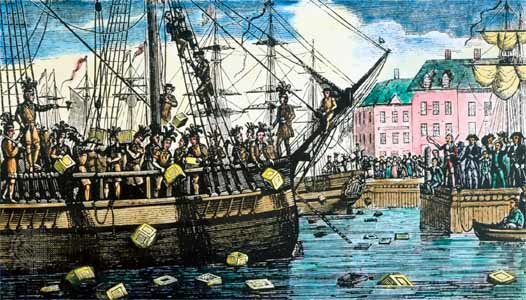
In mid-1773 the world’s largest corporation, the British East India Company, faced a significant problem: it had a massive surplus of tea that it could not sell in England. This oversupply was threatening the financial stability of the company, which sought assistance from the government at Westminster. The result was the Tea Act, a piece of legislation that would allow the British East India Company to bypass colonial merchants and offload its surplus tea in America. This in effect granted the British company a monopoly on tea sales in America, where they could sell it more cheaply than colonial traders (whose tea stock was mostly purchased through smuggling, usually from the French or Dutch). Contrary to folklore, the Tea Act provided no new tax on tea; it did not have to, since a threepence-per-pound duty remained on tea from the remnant Townshend acts of 1767. Even with this duty remaining, the price of the tea would be a remarkable ninepence per pound cheaper than the market price of imported tea in America. British parliamentarians, led by Lord North, believed this reduction in price would be most attractive to the colonists, who would soon forget their high principles about taxation and representation.
“Few in London thought the sweetheart deal was a matter of consequence to anyone but the East India Company, and it received little notice. Some relief would be granted to the struggling corporate giant, without political cost. And surely, Americans would not object to receiving tea at bargain prices. But British prognosticators were wrong. For the Americans the issue was one of self-governance. Whoever levied taxes got to call the shots – including how to spend the money.”
Ray Raphael, historian
They did not reckon on the ability of propagandists to whip up anti-customs sentiment in American cities. The Tea Act was painted as a sneaky attempt to introduced taxed commodities into the colonies by stealth. The merchants, whose profits were threatened by the arrival of cheap tea, were at the forefront of this protest. Again non-importation or boycott agreements were forged, as in the wake of the Townshend duties in 1767-8. Women pledged not to drink the king’s “vile Bohea”; their husbands talked tougher. At a meeting in New York in October 1773, those in attendance declared that “the resolution lately entered into by the East India Company, to send out their tea to America subject to the payment of duties on its being landed here, is an open attempt to enforce the ministerial plan and a violent attack upon the liberties of America.” They decided that once the ships arrived and laid anchor, their cargo should not be offloaded. This would be achieved by non-compliance, harbour strikes and, if necessary, violence. The scene was set for yet another confrontation between the British and her colonists.
